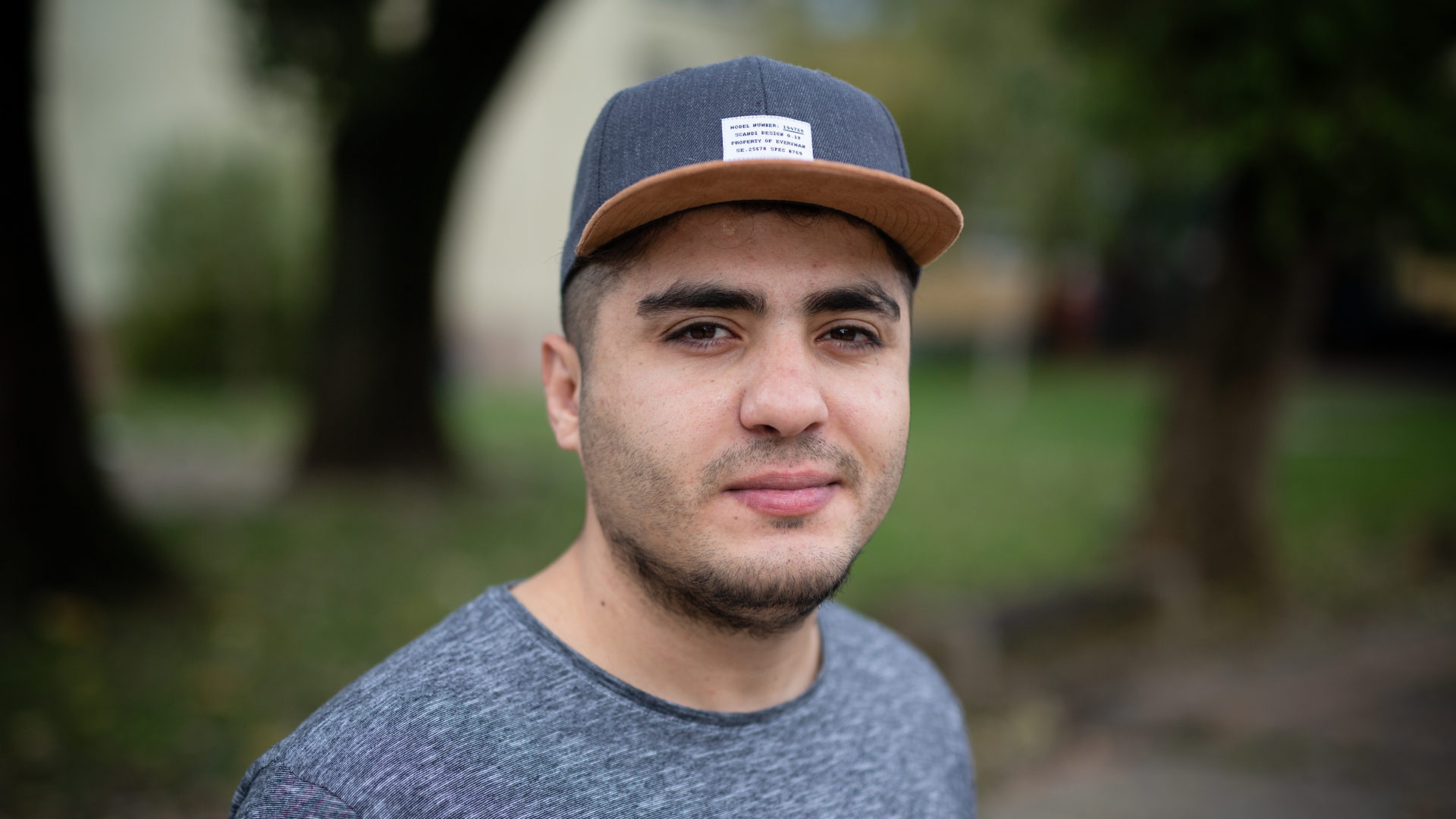Presenting difficult and dangerous issues through humour
In the video above: Mehman Huseynov interviews male members of the public whether they would make their wife vice-president if they were president of a large company, referencing President Ilham Aliyev’s appointment of his wife, Mehriban Aliyeva, to the position of vice-president on 21 February 2017. Published 1 March 2017.
Even neighbours are reluctant to talk to each other about these issues in private for fear of being heard.
“In an authoritarian country like Azerbaijan, it’s difficult to highlight issues. People are afraid to raise issues on social media. Even neighbours are reluctant to talk to each other about these issues in private for fear of being heard.”
“In my work, I’m using political satire – it isn’t just direct criticism of anyone in particular. It’s a humorous way to present these issues.”
According to Mehman Huseynov, this approach is very popular with ordinary Azerbaijanis. People aren’t as afraid to like, share and comment on issues that have been presented through satire and comedy.
“For example, I recently put out a very simple video around the time when the son of an oligarch had his very expensive luxury watch stolen. In the video, I went into a watch shop asking customers if we can unite our efforts and buy a new watch for this kid. This video was shared a lot – people liked it.”
“Food prices go up every day, so I created another video saying… so if you don’t have money to buy food, what’s the problem? We can just buy some bread and make a sandwich with more bread as the filling. It’ll save you money, and hey, why not also have a glass of water.”
The dry sense of humour resonates, and with this, Huseynov tackles the serious issues that are at the core of Azerbaijani society. Another video sees the video blogger address the government line that the country’s oil belongs to the people. The camera follows Huseynov as he conducts a tongue-in-cheek interview with an oil silo.
“Ordinary people don’t get oil money. It doesn’t affect their salaries, their pensions, so in the video, I talk to the oil. I’m asking it ‘when will you come to us?’”
This interview with Azerbaijani anti-corruption video blogger Mehman Huseynov was conducted in November 2019. Since then there have been notable developments both with Huseynov and in the world.
Thank you all for #HelpMehman #beatcancer & #StandUp4HumanRights https://t.co/ofNHqrpIwW @Mehman_Huseynov #MehmanHuseynov #Azerbaijan @HRHFoundation @hfhrpl @forfreemedia @DJintweets @anrurka @anetbonde @delseroad @albana_shala1 @HRHTbilisi @TuranAgentliyi https://t.co/mbAloOFPLo pic.twitter.com/BLJKGpPp0h
— EMIN HUSEYNOV (@EminHuseynovAZ) September 11, 2020
Mehman Huseynov diagnosed with cancer
In September 2020, Turan News Agency announced that Mehman Huseynov’s cancer treatment had been a success.
Huseynov’s condition was first identified in January 2020 while he was undergoing a full examination in neighbouring Georgia to assess injuries sustained from being severely beaten by police in December 2019.
“Upon, Mehman’s arrest, he was brought to a deserted place where he was brutally tortured, beaten, humiliated and abandoned when he could no longer stand on his own feet. After a couple of hours, he was able to call friends who helped bring him to a hospital in Baku. While the doctors in Azerbaijan recognized a number of physical injuries, Mehman was denied hospitalization and a full medical examination.”
Huseynov’s brother Emin set up a gofundme to help with the expensive medical bills. It passed its funding goal in early June 2020 due to the contribution of mostly Azerbaijani citizens. Read the full story here.
Covid-19
Since the start of the Covid-19 pandemic state authorities across western and eastern Europe, the western Balkans, and the Caucasus have taken concerning action in response to the escalating COVID-19 crisis. These actions raise questions about states’ commitments to civic freedoms and human rights. The response of the Azerbaijani authorities in particular led to Human Rights House Foundation publishing a statement entitled “Azerbaijani authorities must not continue to use COVID-19 pandemic to further crackdown on civil society”
Over a million followers

Mehman Huseynov’s unique approach to journalism and focus on self-publishing has helped him to reach a large audience despite the hostile atmosphere for independent media in the country. At the time of this interview’s publication, he has over a million followers in total across all of his platforms, with more than four million views on his YouTube channel. In 2013, he began posting on Facebook, under the name SANCAQ, where he now has more than 360,000 followers, his SANCAQ Instagram account has more than 336,000 followers.
“Very often people approach me, and they say that I’m doing a great job. They also say they are sorry that they can’t support me publicly because of the risks.”
Though his audience includes a portion of international followers, the vast majority of the people liking, commenting and sharing are ordinary Azerbaijanis. He notes that the older generation tend to follow him on Facebook, while younger Azerbaijanis are more active on Instagram.
Advice for young people pursuing video blogging
If someone runs a blog, on the next day, this person will be taken to the police.
While Mehman Huseynov has seen the advance in technology making it easier from the production side, the challenge that faces young Azerbaijanis is the reality of the situation in the country for journalism and free expression. Reprisals against one’s self, or one’s family members is the situation that emerging bloggers could face.
“Even in the beginning, it was dangerous, when I was mostly a social blogger focusing on social issues.”
“If someone runs a blog, on the next day, this person will be taken to the police. Well we are now recruiting new young people in our project, we want to expand the number of bloggers in Azerbaijan, but it will be very challenging.”
“They need to know that tomorrow the authorities can cause such pressure that family members can suffer.”
“International solidarity helps me, and all local offices and policemen know that I have international support. But when some new blogger comes up, they are very rough on them. To become a political blogger, you need years and good relationships with international organisations, otherwise, you just can’t do it.”
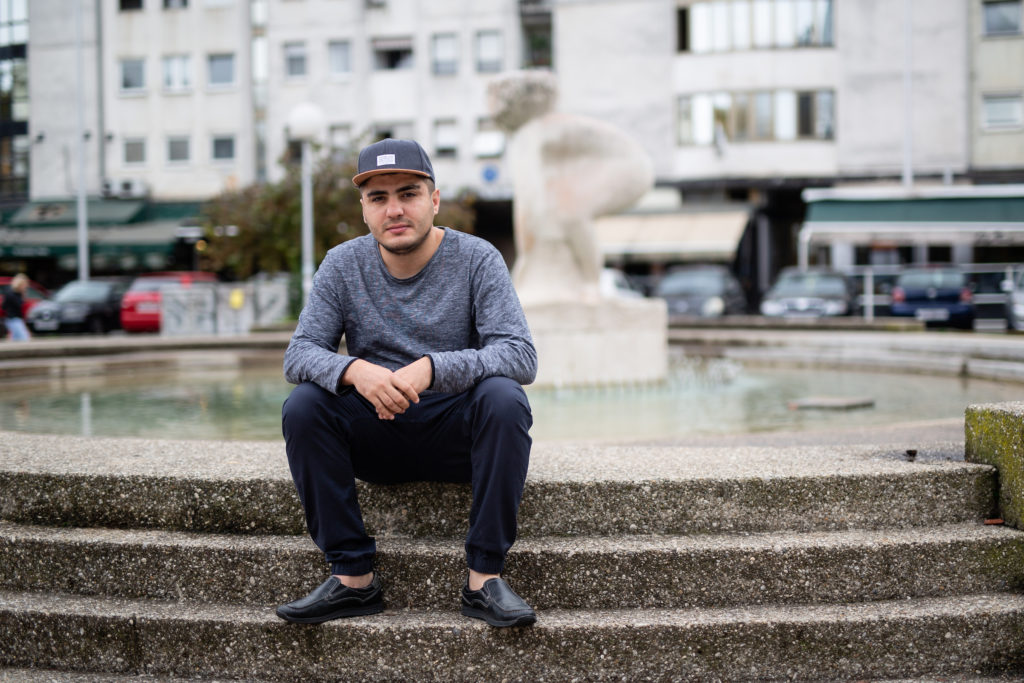
When Huseynov started as a blogger, he focused on social issues, but a few years later, with an urge to work more proactively as a journalist and tackle corruption, his focus switched to political topics.
“At first, I started with my own investigations, and I had some sources from insiders. Later on, it became the investigations of my deputy at IRFS, Hafiz Babali. He is one of the best investigative journalists in Azerbaijan, and I was transforming his investigations into video content. Now it’s a partnership – sometimes with his sources, and sometimes with my own.”
“The more I wrote about other people’s problems, the more intimidation I got from the government, and it fuelled and motivated me even more. They were trying to suppress my family and I.”
Abduction, surveillance, travel ban, and prison
I decided that I would be in Azerbaijan no matter what. Despite these reasons to stay abroad, I had to return because this was my fight and I had to be there.
“The authorities started intimating me, in 2011. I was physically attacked in the middle of the day. A bag was put over my head and I was forced into a car. I was taken to a police station. They threatened to have me expelled from university. I was followed and they began surveillance on me.”
“In 2012, people started calling me the ‘Eurovision Prisoner’ because I was writing about the Eurovision song contest and the authorities launched a criminal case against me.”
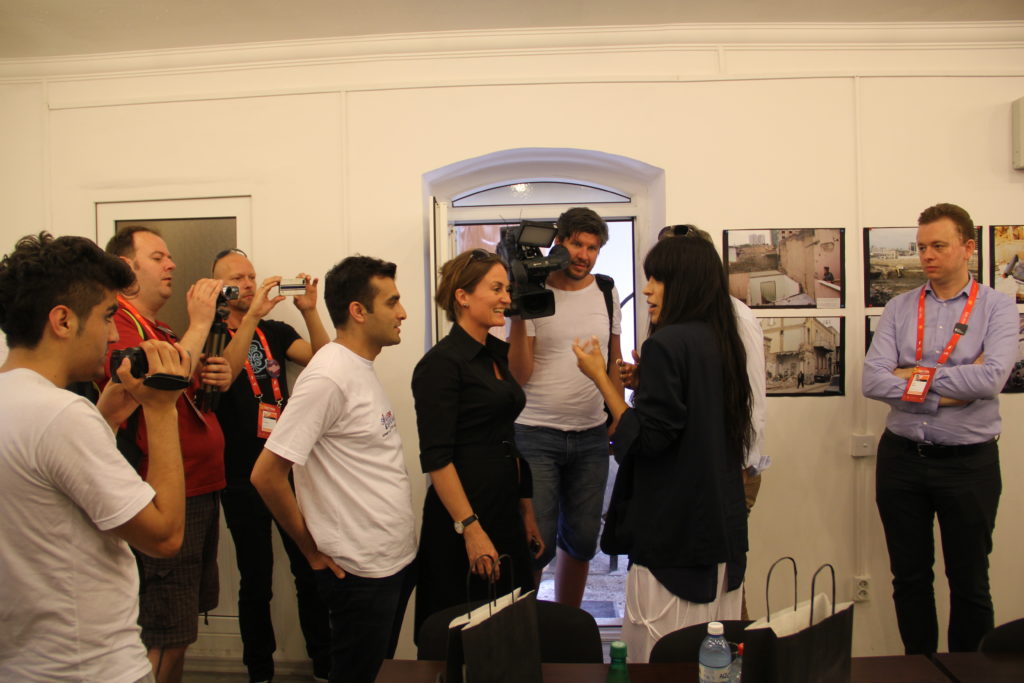
“In 2012, ahead of the Eurovision song contest, the authorities evicted residents and demolished a number of apartment blocks to clear the way for construction, to build a big concert hall where the contest would occur. At the time, they called it ‘Beautifying Baku’. In response to the evictions and demolition, we started the “sing for democracy” human rights campaign.”
“I was brought to the court, and the authorities wanted me to serve 6 months of pre-trial detention, but at the time of my trial, the president of PACE was in Azerbaijan and met with president Aliyev and this 6-month term was suspended.”
“Because of this work around the Eurovision song contest, the authorities started a file on me around May of 2012, they started a criminal case against me, and I also got a travel ban.”
“In 2012, when they opened the criminal case, I was abroad, which they knew. They opened the case in the hope that I wouldn’t return, but I did.”
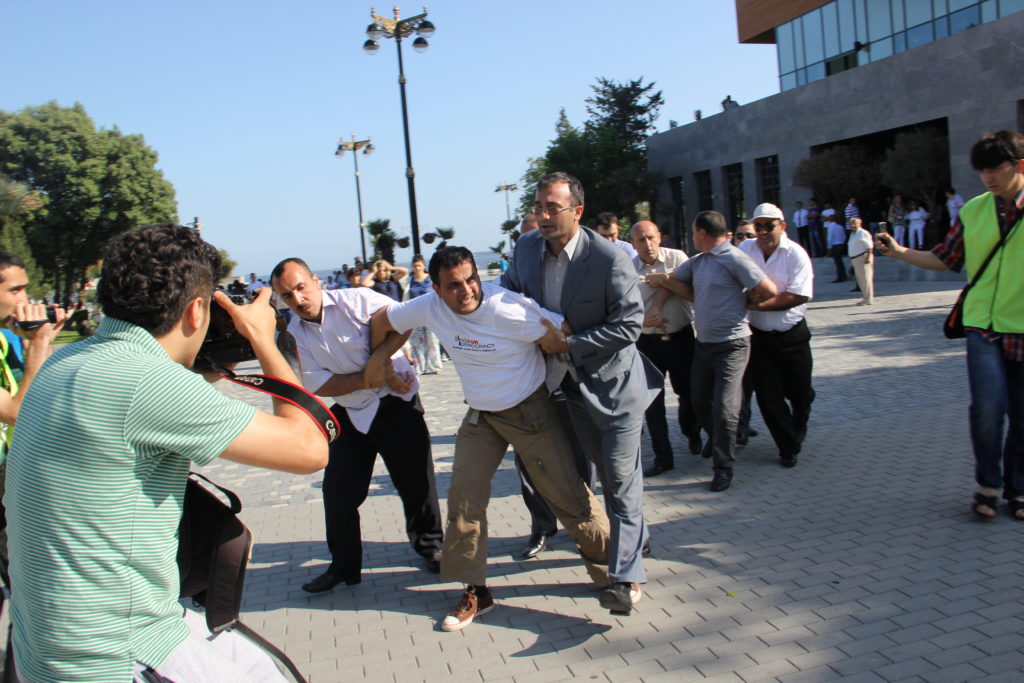
“At that time, I was charged with accusations of hooliganism against a policeman, but that was not true. By not returning home, I would be justifying these charges, so at the very beginning of this road, I decided that I would be in Azerbaijan no matter what. Despite these reasons to stay abroad, I had to return because this was my fight and I had to be there.”
“I think my return helped… people started to believe me because I returned. They saw some people are willing to fight no matter what.”
During this time, Huseynov’s official documentation was confiscated by police. Living without identification and official documentation has closed the country’s infrastructure to him, preventing him from accessing things such as public healthcare and further education. HRHF documented the reprisals against Huseynov for its 2018/2019 “Freedom for Mehman Huseynov” campaign.
Mehman Huseynov’s story is intrinsically linked to the story of his organisation the Institute for Reporters’ Freedom and Safety (IRFS) has constantly been at the forefront of protecting targeted journalists and raising awareness of the dire situation of expression in Azerbaijan.
All three of the organisation’s directors have been targeted as a result of their work with one in exile, Mehman Huseynov having spent two years in prison, and one dead following a violent attack.
“Our organisation, IRFS, has suffered many losses. In 2014, criminal prosecution was launched against us, and my brother Emin, who was our first director, hid for 10 months in the Swiss embassy before fleeing the country.”
“Rasim Aliyev who helped my brother to flee became the new director of our organisation and in 2015 he was attacked. It was made to look as though football fans attacked him, but this was just a performance, he was killed for political reasons.”
“He was killed in this attack, on 8 August 2015, it was exactly one year after he helped Emin get to the Swiss embassy. Then I became the director and I was imprisoned for two years.”
Mehman Huseynov spent two years in prison linked to an incident that occurred on 9 January 2017. According to eyewitnesses, he was forcibly dragged into an unmarked vehicle and taken to an unknown destination by unidentified assailants in civilian clothes, as reported by IRFS and the Campaign to Free Political Prisoners. These assailants were later revealed as police agents and Huseynov faced administrative charges of resisting police.
He was released the next day. The court in Baku fined him 200 AZN (around 100 euros) for “disobeying the police.”
A month prior to the abduction, he shared a video in which he contrasted the financial difficulties of elderly citizens with the “palaces” built by members of the government.
On being released by police after his abduction, Mehman Huseynov reported that he was tortured –consistent with the findings of an examination by an independent team of medical doctors, sent from Front Line Defenders and the Georgian Centre of Psychological and Medical Rehabilitation for Torture, a member organisation of Human Rights House Tbilisi.
He was sentenced to two years in prison for defamation on 3 March 2017, based on his reporting that he was tortured while in police custody.
Immediately prior to his sentencing for defamation, he published a video on 1 March 2017 asking male members of the public whether they would make their wife vice-president if they were president of a large company. The video contributed to the public debate around President Ilham Aliyev’s appointment of his wife, Mehriban Aliyeva, to the position of vice-president on 21 February 2017.
At the time of his sentencing, HRHF responded: “Mehman Huseynov has been sentenced to two years imprisonment because he dared to say in Azerbaijan… that he should not be tortured, he should not be arrested, and in fact, he should be free to do his work.” HRHF also pointed to the absurdity of it being illegal to resist one’s own abduction, in an op-ed for Meydan TV.
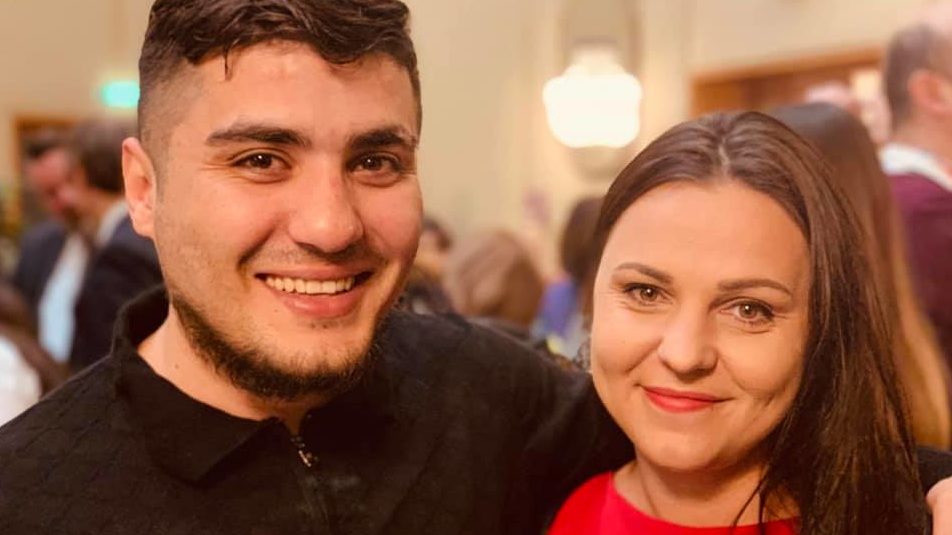
Huseynov maintained his innocence throughout his imprisonment, calling the case against him politically motivated, a view shared by the international human rights community. On 26 December 2018, the Azerbaijani authorities put forward new criminal charges against him. These charges were dropped on 22 January 2019 following strong national and international protests.
Mehman Huseynov was released from prison on 22 March 2019, after serving a two-year sentence for defamation. This followed many years of repression by the authorities aimed at silencing him.
Refusing to be silenced
“Before I was imprisoned, they attempted to buy me. They offered me money, a nice living place but I never accepted those terms and I wasn’t silenced.”
“Then I lost my freedom, and I lost my mother while in prison. One of my brothers has asylum in another country, the other brother lost his job because of me. Now it doesn’t make sense for me to be silent because I have already lost everything that I can lose. The only thing left is my murder and I am not afraid.”
“I am a patriot and I’m doing this work to see real progress in my country – this is my goal. I’m calling for justice. I’m calling for human rights. Freedoms, basic freedoms – those things that are the baseline for any normal country.”
“We can see the authorities starting to imitate some reforms, trying to have better relations so if they are serious, about opening up the freedom of expression situation, we will have more bloggers and journalists.”
Mehman Huseynov is an Azerbaijani photojournalist, video blogger, and human rights defender. He reaches out to ordinary citizens through his videos, where his personal touch and sense of humour have earned a substantial following on his social media accounts. His valuable commentary has been essential in stimulating debate on key political, social and economic issues affecting Azerbaijanis.
He is the director of the Institute for Reporters’ Freedom and Safety (IRFS).


